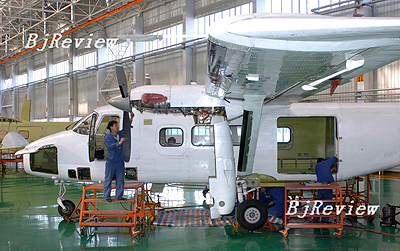
China has pledged to open up its secretive military sectors to foreign investment, speeding up the restructuring of defense enterprises and encouraging a qualified few to seek offshore stock sales, said the Commission of Science Technology & Industry for National Defense (COSTIND) in a statement posted on its website on June 22. The COSTIND said China will allow foreign investors to "conditionally participate in the shareholding restructuring of China's military companies."
The statement, issued jointly with the National Development and Reform Commission and the State-Owned Assets Supervision and Administration Commission, said companies which design and produce strategic and other major weapons that involve core state secrets and have a direct bearing on national security will still be off-limits to foreign investment.
Work on a draft of the new policy is already underway and will definitely bridge the policy gap--military manufacturers began reforms several years ago but have only made slow progress due to the lack of specific and explicit policies. Of the several thousand companies under China's 10 major military industrial complexes, only 49 have been listed on the local stock exchange after restructuring, mainly through transforming their lines of business from military-oriented ones to civil ones.
Outside investments
The degree of openness to private capital will depend on the importance of the weapons a company produces. Outside investment, including capital from overseas, can be channeled into companies producing less sensitive military equipment as well as goods for the civil and consumer markets.
The statement categorizes the military sector's restructuring into three groups. First, a few key military enterprises with national strategic security concerns and core state secrets will remain solely in state hands. Second, the state will control the stakes of military enterprises that design, assemble and produce crucial weapons and systems. Domestic investment is encouraged to participate in the market-oriented restructuring, incorporation and merger of these enterprises. Furthermore, these enterprises are allowed to lease out, transfer or auction their non-core assets.
The third group is allowed to adopt varied forms of shareholding reform, in accordance with the importance of the weapons they produce, inviting domestic as well as foreign capital to raise money in the capital market.
According to the COSTIND, the military industry's regulator, nearly 1,000 arms makers are allowed to receive investment from overseas, chiefly involving logistics, information equipment, heavy duty machine manufacturing and arms component manufacturing.
"The end goal is to deliver a more market-oriented and innovative industry," said COSTIND spokesman Huang Qiang. "The decision to speed up shareholding reform of military enterprises is conducive to expanding financing channels and taking full advantage of diversified non-state capital to enhance the overall defense industry."
According to Huang, arms makers that meet certain requirements after the reform will continue to receive certificates for scientific research and production of military products.
Ju Jinwen, a research fellow with the Chinese Academy of Social Sciences, believes China's defense sector is moving from a closed and monopolized industry to one that is becoming more open and competitive. Private investment will enhance the innovative capacity of China's arms manufacturing and the efficiency of national defense expenditures.
Luo Kaiyuan, a researcher with the China Information Center, said that economic globalization has intensified competition in the military industry worldwide. As a result, Chinese arms makers have to boost their competitiveness through restructuring and reform. Otherwise, China will further winden its gap with major developed countries in this sector, hindering its defense construction and economic development.
Key issues
Others expressed worries about possible chaos if the state ceases to be the controlling shareholder of some military industrial complexes, since the shareholding reform still remains in its initial stage.
Concerns about the shareholders' right to audit the accounts against the secret nature of military companies top all these worries.
| 